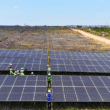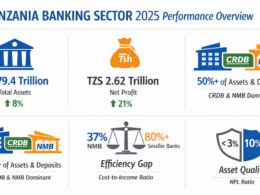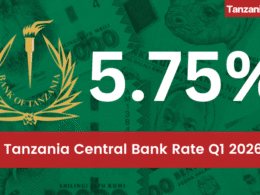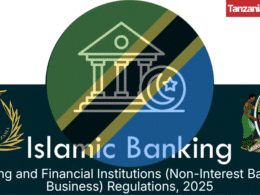TanzaniaInvest had the opportunity to interview Charles Asiedu, the Managing Director of Ecobank Tanzania, a subsidiary of the pan-African banking group, Ecobank.
During the interview, Asiedu sheds light on the factors driving Ecobank Tanzania’s impressive growth and outlines the bank’s strategy for staying competitive and further expanding its presence in a saturated market, with a particular focus on developing diverse customer segments.
Furthermore, Asiedu shares his insights into the key economic sectors that are poised to spearhead this growth, along with his perspective on the future integration of banks, fintechs, and telecom companies.
TanzaniaInvest: ECOBANK Tanzania’s net profit more than doubled to TZS 1.7bn in 2022 compared to TZS 692mn recorded in 2021. Can you comment on the recent growth of ECOBANK Tanzania and the factors contributing to it?
Charles Asiedu: We were tired of experiencing losses in the past, so we collectively decided to turn things around. This motivated everyone to work towards growth and regain customer trust. As a result, we successfully reengaged customers who had left us due to poor performance, which is reflected in our balance sheet. In Q1 2023, our revenues were nearly 50% higher compared to Q1 2022, primarily due to increased deposits and strong customer confidence. The passion and dedication of our staff in delivering excellent service have also played a significant role.
“In Q1 2023, our revenues were nearly 50% higher compared to Q1 2022, primarily due to increased deposits and strong customer confidence.”
TanzaniaInvest: Most Tanzanian banks are showing very positive results in Q1 2023. What are your expectations for 2023 in terms of expansion and growth?
Charles Asiedu: We are optimistic about 2023 and anticipate stronger expansion and growth. We have seen an increase in the number of deals coming to our table, which will contribute to further growth.
In terms of sectors with the greatest growth potential and opportunities for our bank, I believe the mining sector will play a significant role. There is a deliberate effort to increase the mining sector’s contribution to Tanzania’s GDP, and we have strong expertise in this area. We are collaborating with potential investors and those already operating in the sector, and we expect positive results.
“The mining sector will play a significant role. The construction sector is also booming.”
Additionally, the agriculture sector is crucial as Tanzania aims to be self-sufficient in food production. We have platforms to support commercial farmers and facilitate exports. From the logistics sector, we have observed improved efficiency of the port system, which is boosting cross-border business, particularly to neighbouring countries accessing the Dar es Salaam port. Our partnership with Tanzania Ports Authority (TPA) and the other port operators is helping us provide support and convenience to the users of the port.
The construction sector is also booming, with various infrastructure projects underway, such as the Standard Gauge Railway (SGR) and East African Crude Oil Pipeline (EACOP). Ecobank is leveraging its experience to provide support in these areas for future growth.
The tourism sector is also critical given the investment the government has made following the Royal Tour by the President herself. We are, therefore, not surprised that tourist visits have returned to pre-pandemic levels of 1.5 million and are forecast to reach 5 million by 2025. Ecobank has robust tailored solutions for tour operators, hotels and restaurants to support such growth.
“Tourist visits have returned to pre-pandemic levels of 1.5 million and are forecast to reach 5 million by 2025.”
TanzaniaInvest: Your services portfolio caters to large corporate, medium-sized businesses, and individuals. Which segment represents the largest share, and which do you plan to further develop?
Charles Asiedu: Currently, our largest chunk of the portfolio is in the corporate sector. However, we are actively expanding and exploring opportunities within the value chain of the corporate sector, such as SMEs that are part of their ecosystem. We also believe we have probably the best products in Africa in the retail space, and we are aggressively selling now to gain more market share. We have diversified our product offerings to cater to all segments, and our goal is to grow the SME and consumer sides to complement our strong corporate portfolio.
“We have probably the best products in Africa in the retail space, and we are aggressively selling now to gain more market share.”
TanzaniaInvest: How do you stay competitive, with 34 commercial banks operating in the country and pursuing a similar clientele?
Charles Asiedu: Our competitiveness stems from the quality of our service. For instance, ECOBANK has a dedicated branch supporting port transactions, ensuring uninterrupted processing of payments and clearances. This branch operates 24/7 with three shifts of staff members working eight hours each. We have made significant investments to strengthen our presence and support ongoing projects related to the port system. Our aim is to ensure that the port platform remains active and facilitates seamless operations, contributing to the growth of businesses.
For individuals, we offer a notable product: our mobile app platform called Ecobank Mobile. This platform allows customers to transact seamlessly without the need for a separate wallet account. It is highly versatile, enabling global transactions, payments (including school fees and utility bills), fund transfers to any bank or wallet account, and the creation of virtual cards for specific purposes. We consider this product the best in Africa, aligning with our Pan-African strategy and offering convenience to empower customers.
Our unmatched African network also helps us facilitate cross-border business in Africa and beyond. Ecobank is the only bank in Tanzania with sister affiliates present in all eight countries sharing borders with Tanzania. This makes us the bank of choice for all businesses trading in all the neighbouring countries.
“Our unmatched African network also helps us facilitate cross-border business in Africa and beyond.”
TanzaniaInvest: Telecoms and fintechs have been disrupting the banking space with payment and other solutions that do not require a bank account. How do you see the future integration of banks, fintechs, and telecom companies? Do you believe they will coexist or potentially merge?
Charles Asiedu: Banks will always remain relevant due to their importance to the economy and the regulatory framework they operate within. While fintechs and telecom companies bring innovation and agility to the market, we believe in partnering with them rather than seeing them as competitors. Banks should be flexible and agile enough to work with these entities and leverage their strengths. We can expect increased collaboration and integration, but the formal banking system will continue to play a vital role. Regulations will ensure a balance between innovation and stability.
“While fintechs and telecom companies bring innovation and agility to the market, we believe in partnering with them rather than seeing them as competitors.”
TanzaniaInvest: What are your thoughts on the development of cryptocurrencies as a means of payment? Do you see them as a realistic alternative to traditional currencies?
Charles Asiedu: The development of cryptocurrencies has been interesting to observe. Central banks are increasingly exploring the idea of central bank digital currencies (CBDCs) and getting involved in the crypto space. While cryptocurrencies offer certain advantages, such as flexibility, it is crucial to have regulations in place to avoid potential risks. CBDCs could operate alongside traditional currencies, and we may see a parallel system emerge. However, it is unlikely that they will completely replace formal currencies. The stability and regulatory framework provided by traditional banking systems are vital for the overall economy. Currently, ECOBANK does not engage with cryptocurrencies, but we comply with the regulations of each market we operate in.
TanzaniaInvest: ECOBANK is present in 33 African countries. How does Tanzania fit into ECOBANK’s overall strategy, and what are your plans for further growth and positioning within the group?
Charles Asiedu: Tanzania is highly relevant to ECOBANK’s ambitions, as evidenced by our significant investment of USD 90 million in the country. Our goal is to be within the top 10 banks in Tanzania in the next five years and contribute positively to the country’s image and economy. We have the support of our group office and shareholders to achieve this, and we believe the momentum we have built in the market in the last two years will continue to drive us forward.
“Our goal is to be within the top 10 banks in Tanzania in the next five years and contribute positively to the country’s image and economy.”
What sets ECOBANK apart is our presence in all countries sharing a border with Tanzania, which positions us well to support trade flows in the region. This advantage, along with our representative offices in key locations such as Paris, London, Dubai, and Addis Ababa, enables us to facilitate transactions and connect Tanzania to 33 African markets.











